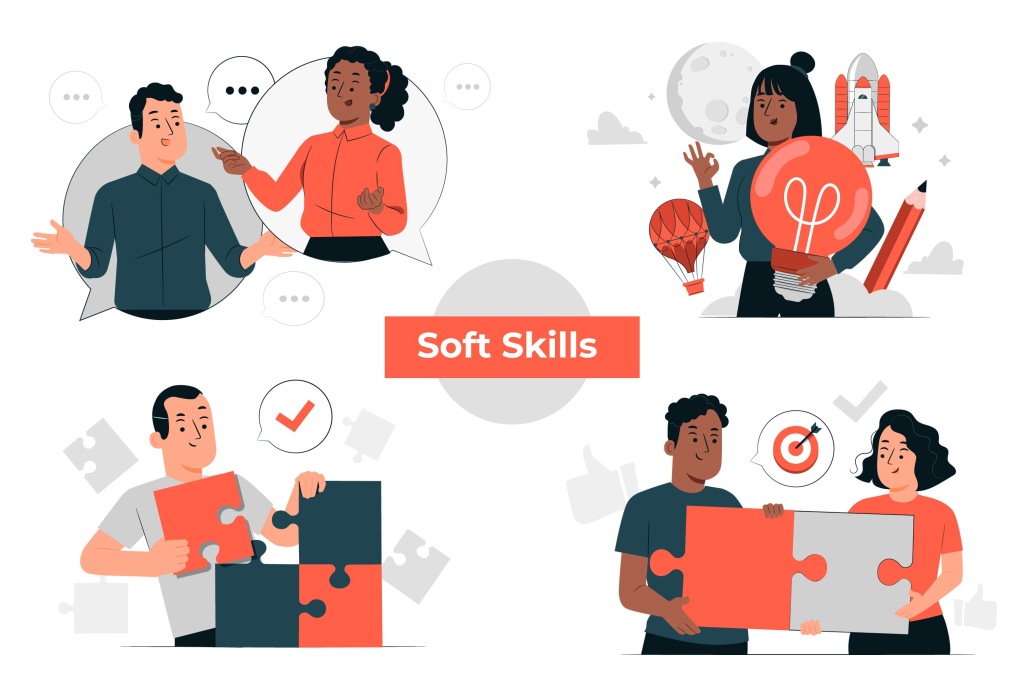Unlocking Success: The Best Soft Skills Examples
In today’s competitive job market, having technical skills alone is not enough to ensure success in your career. Employers are increasingly looking for candidates who possess a combination of technical skills and essential soft skills.
Soft skills are personal attributes that enable individuals to interact effectively with others, communicate clearly, and work well in a team. They are the intangible qualities that make us human. Developing these skills is essential for unlocking success in any profession. In this blog post, we will explore some of the essential soft skills examples that can help you stand out in your job and grow your career.
From effective communication and problem-solving to leadership and time management, read on to learn more about how these skills can help you achieve your career goals.
-
Introduction: The importance of soft skills in career growth.

Soft Skills – Piusify Tech Tips
In today’s competitive job market, possessing technical skills and qualifications alone is no longer enough to ensure career success. Employers are increasingly recognizing the value of soft skills in the workplace and are actively seeking candidates who possess them. Soft skills, also known as transferable or interpersonal skills, are the personal attributes and qualities that enable individuals to effectively navigate their professional and personal lives.
While hard skills are specific to a particular job or industry, soft skills are universal and can be applied across various roles and industries. These skills are often intangible and difficult to measure, but they play a crucial role in determining an individual’s ability to thrive in their career.
Soft skills encompass a wide range of attributes, including communication, teamwork, problem-solving, adaptability, leadership, time management, emotional intelligence, and many more. These skills are not only essential for individual career growth but also contribute to the overall success of organizations.
Employers value employees who possess strong soft skills as they contribute to increased productivity, effective collaboration, better customer service, and a positive work environment. Soft skills are particularly important in roles that involve interaction with clients or customers, leadership positions, and teamwork-oriented environments.
In this blog post, we will explore and provide examples of essential soft skills that can unlock success and accelerate career growth. Whether you are a recent graduate, a mid-career professional, or someone looking to switch careers, developing and showcasing these soft skills will undoubtedly give you a competitive edge in the job market and pave the way for a fulfilling and prosperous career.
2. Communication skills: The key to effective collaboration and building relationships

Communication skills are undeniably at the heart of every successful professional’s journey. Whether you’re climbing the corporate ladder, building your own business, or seeking to excel in any field, the ability to effectively communicate is essential for collaboration and relationship-building.
Think about it – how often have you encountered misunderstandings or conflicts that could have been avoided with clear and concise communication? The way we convey our thoughts, ideas, and emotions can make all the difference in fostering productive collaborations and cultivating strong relationships.
When it comes to effective collaboration, strong communication skills enable individuals to articulate their ideas, actively listen to others, and contribute to discussions with clarity and purpose. By expressing thoughts and concepts in a way that others can understand and relate to, professionals can bridge gaps, align goals, and work towards common objectives.
Building relationships is also heavily reliant on effective communication. Whether it’s with colleagues, clients, or stakeholders, the ability to connect and engage through clear and empathetic communication is crucial. By actively listening, demonstrating empathy, and expressing oneself authentically, professionals can establish trust, foster mutual understanding, and nurture long-lasting relationships.
Moreover, effective communication skills extend beyond verbal interactions. Non-verbal cues such as body language, facial expressions, and tone of voice also play a significant role in conveying messages and building rapport. Being aware of these non-verbal signals and using them to enhance communication can greatly impact how others perceive and respond to you.
In summary, strong communication skills are the key to unlocking success in any career. By mastering the art of effective collaboration and relationship-building through clear, empathetic, and authentic communication, professionals can open doors to new opportunities, foster meaningful connections, and propel their career growth to new heights.
-
Problem-solving and critical thinking: Navigating challenges and finding innovative solutions

Problem-solving and critical thinking are essential soft skills that can greatly contribute to your career growth. In today’s fast-paced and ever-changing work environment, challenges are bound to arise. Having the ability to navigate these challenges and find innovative solutions is crucial for success.
Problem-solving involves identifying issues, analyzing their root causes, and developing effective strategies to overcome them. It requires a combination of analytical thinking, creativity, and resourcefulness. Employers highly value individuals who can take a proactive approach to problem-solving, as it demonstrates their ability to handle complex situations and make informed decisions.
Critical thinking goes hand in hand with problem-solving. It involves objectively evaluating information, analyzing different perspectives, and making logical connections. By honing your critical thinking skills, you can effectively assess the validity of ideas, make well-informed judgments, and identify potential risks or opportunities.
In the workplace, problem-solving and critical thinking skills can be applied to various scenarios. Whether it’s troubleshooting technical issues, resolving conflicts within a team, or developing new strategies to improve efficiency, these skills enable you to approach challenges with confidence and find innovative solutions.
To enhance your problem-solving and critical thinking abilities, it’s important to continuously develop your analytical and creative thinking skills. This can be done through activities such as brainstorming sessions, engaging in logical reasoning exercises, and seeking feedback from colleagues or mentors. Additionally, staying updated with industry trends and seeking out new knowledge can provide you with a broader perspective, enabling you to approach problems from different angles.
By mastering problem-solving and critical thinking skills, you not only become a valuable asset to your current employer but also position yourself for long-term career growth. These skills showcase your adaptability, resilience, and ability to think outside the box – qualities that are highly sought after in today’s competitive job market. So, embrace challenges as opportunities for growth and let your problem-solving and critical thinking skills shine as you unlock success in your career.
-
Adaptability and flexibility: Thriving in a dynamic work environment

In today’s fast-paced and ever-changing work environment, adaptability and flexibility have become essential soft skills for career growth. Companies and industries are constantly evolving, and the ability to adapt and thrive in this dynamic landscape is crucial for success.
Adaptability refers to the willingness and ability to adjust to new situations, challenges, and demands. It is about being open-minded, embracing change, and being proactive in finding solutions. An adaptable employee is not only comfortable with change but also sees it as an opportunity for growth and improvement.
Flexibility, on the other hand, is the ability to adjust one’s approach, mindset, and work style to accommodate different circumstances and requirements. It involves being open to new ideas, perspectives, and ways of doing things. A flexible individual can easily switch gears, multitask, and handle unexpected situations with ease.
Thriving in a dynamic work environment requires more than just technical skills. Employers value employees who can quickly adapt to new technologies, processes, and market trends. These individuals are not afraid to step out of their comfort zones and embrace challenges head-on.
Adaptability and flexibility also contribute to effective teamwork and collaboration. In a diverse and rapidly changing workplace, individuals who can easily adjust and work well with different personalities and work styles are highly sought after. They can navigate through different projects, teams, and roles seamlessly, promoting a harmonious and productive work environment.
To develop these essential soft skills, it is important to cultivate a growth mindset and a willingness to learn and embrace change. Seek out new experiences, take on challenging assignments, and continuously update your knowledge and skills. Embrace feedback and constructive criticism as opportunities for improvement and growth.
In summary, adaptability and flexibility are essential soft skills that enable individuals to thrive in a dynamic work environment. By embracing change, being open-minded, and adjusting one’s approach, professionals can position themselves for success and career growth in today’s ever-evolving job market.
-
Time management and organization: Balancing tasks and maximizing productivity
Time management and organization are key factors in achieving career success and maximizing productivity. In today’s fast-paced world, juggling multiple tasks and responsibilities has become the norm. The ability to effectively manage time and stay organized is crucial for maintaining a healthy work-life balance and ensuring that all deadlines are met.
One of the first steps to mastering time management is setting clear goals and priorities. By identifying what needs to be done and assigning specific deadlines, you can create a roadmap for your daily, weekly, and monthly tasks. This will help you stay focused and avoid getting overwhelmed by the sheer volume of work.
Another important aspect of time management is the ability to prioritize tasks. Not all tasks are created equal, and it’s essential to differentiate between urgent and important tasks. By sorting tasks based on their level of importance and urgency, you can allocate your time and energy accordingly. This way, you can tackle high-priority tasks first and ensure that they are completed within the specified timeframe.
Effective time management also involves breaking down complex projects into smaller, manageable tasks. This technique, known as task chunking, allows you to tackle large projects step by step, making them less daunting and more achievable. By setting realistic deadlines for each subtask, you can maintain a steady workflow and prevent procrastination.
In addition to time management, maintaining an organized workspace is crucial for productivity. A cluttered and chaotic environment can hinder focus and increase stress levels. Take the time to deciliter your physical workspace, establish efficient filing systems, and utilize digital tools for better organization. This will not only save time searching for files or documents but also create a conducive environment for concentration and creativity.
Lastly, effective time management and organization require discipline and self-motivation. It’s important to establish healthy habits and routines that promote productivity. This may involve setting boundaries, avoiding time-wasting activities, and practicing self-care to maintain a well-balanced lifestyle.
By mastering time management and organization skills, you can strike a harmonious balance between your personal and professional life, enhance productivity, and unlock your true potential for career growth and success.
-
Leadership and teamwork: Inspiring others and fostering a positive work environment
Leadership and teamwork are crucial soft skills that can greatly contribute to your career growth and success. Being able to inspire others and foster a positive work environment demonstrates your ability to effectively lead a team and achieve collective goals.
A strong leader not only possesses the necessary skills and knowledge but also has the ability to motivate and influence others. They lead by example, setting high standards and encouraging their team members to reach their full potential. By fostering a positive work environment, leaders create a sense of belonging, trust, and collaboration among team members. This not only enhances productivity and efficiency but also boosts morale and job satisfaction.
Effective teamwork goes hand in hand with leadership. It involves working harmoniously with others, pooling together diverse skills and perspectives, and collectively working towards a common objective. Teamwork requires effective communication, active listening, and the ability to resolve conflicts constructively. When individuals come together as a cohesive unit, leveraging each other’s strengths and supporting one another, they can achieve remarkable results.
Employers highly value individuals who possess strong leadership and teamwork skills. These skills are essential in various professional settings, whether you’re leading a team, collaborating with colleagues, or managing client relationships. By demonstrating your ability to inspire others, foster collaboration, and create a positive work environment, you not only enhance your own career prospects but also contribute to the overall success of your organization.
To develop your leadership and teamwork skills, consider seeking opportunities to take on leadership roles, participating in team-building activities, and actively seeking feedback from colleagues and mentors. Continuously honing these skills will not only unlock your potential for success but also make you a valuable asset in any professional setting.
-
Emotional intelligence: Understanding and managing emotions for better relationships
Emotional intelligence is a crucial soft skill that plays a significant role in personal and professional success. The ability to understand and manage emotions is essential for building better relationships, both in the workplace and in personal life.
Having emotional intelligence enables individuals to empathize with others, understand their perspectives, and respond appropriately to various situations. It involves recognizing and managing one’s own emotions, as well as effectively navigating through social interactions.
In the workplace, emotional intelligence can lead to better teamwork, improved communication, and enhanced collaboration. When individuals are emotionally intelligent, they can effectively resolve conflicts, handle workplace stress, and maintain a positive work environment.
For example, a leader with high emotional intelligence can inspire and motivate their team members, understand their needs and concerns, and provide support when necessary. This fosters trust, loyalty, and productivity within the team.
In personal relationships, emotional intelligence helps individuals develop stronger connections with others. It allows for effective communication, active listening, and the ability to understand and respond to the emotions of loved ones.
To enhance emotional intelligence, one can practice self-awareness by recognizing their own emotions and triggers. This self-reflection helps individuals better understand how their emotions impact their behavior and relationships.
Moreover, developing empathy is vital for emotional intelligence. Empathy involves putting oneself in another person’s shoes and understanding their emotions and experiences. By practicing empathy, individuals can build deeper connections with others and foster better relationships.
In conclusion, emotional intelligence is a critical soft skill that enhances relationships, both personally and professionally. By understanding and managing emotions, individuals can create a positive and supportive environment, leading to greater success and personal growth.
-
Networking and relationship-building: Expanding professional connections and opportunities
Networking and relationship-building are essential soft skills that can greatly contribute to career growth and success. In today’s competitive job market, it’s not just about what you know, but who you know. Building a strong professional network allows you to tap into a wealth of opportunities, resources, and support that can propel your career forward.
Networking goes beyond simply attending industry events or collecting business cards. It’s about forging genuine connections, establishing rapport, and nurturing relationships with individuals who can potentially become mentors, collaborators, or even future employers. These connections can provide valuable insights, guidance, and referrals that can open doors to new opportunities and advancements in your career.
In the digital age, networking has evolved to include online platforms such as LinkedIn, professional forums, and virtual networking events. Leveraging these platforms can help you expand your reach and connect with professionals from all over the world. Engaging in online communities and participating in relevant discussions can showcase your expertise, raise your visibility, and attract like-minded professionals who share your interests and goals.
Relationship-building is a continuous process that requires time, effort, and genuine interest in others. It’s about nurturing existing connections, reaching out to new contacts, and maintaining regular communication. By staying in touch, offering support, and showing genuine interest in others’ success, you can build a strong network of individuals who will be willing to reciprocate and support your career growth.
Networking and relationship-building also extend beyond your immediate industry or profession. It’s essential to diversify your network and connect with individuals from different backgrounds, industries, and levels of expertise. This broader network can provide fresh perspectives, unique opportunities, and a wider range of professional connections.
In conclusion, networking and relationship-building are not just buzzwords; they are powerful soft skills that can unlock a world of opportunities for career growth. By expanding your professional connections, nurturing relationships, and actively engaging in networking activities, you can position yourself for success and open doors to new possibilities in your career journey.
-
Conflict resolution and negotiation: Resolving conflicts and reaching win-win solutions
Conflict resolution and negotiation skills are essential for career growth. In any professional setting, conflicts are bound to arise due to differences in opinions, conflicting interests, or misunderstandings. It’s crucial to possess the ability to address these conflicts effectively and reach win-win solutions that satisfy all parties involved.
Being skilled in conflict resolution means having the ability to identify and understand the root causes of conflicts, as well as the emotional intelligence to manage and navigate through them. It requires active listening, empathy, and the ability to remain calm and composed even in tense situations.
Effective negotiators are adept at finding common ground and creating mutually beneficial outcomes. They understand the importance of compromise and are skilled at persuading others to see different perspectives. By employing effective negotiation techniques, individuals can foster positive relationships, build trust, and achieve favorable outcomes for both themselves and their organizations.
In the workplace, conflict resolution and negotiation skills can be applied in a variety of scenarios. Whether it’s resolving conflicts among team members, negotiating project timelines and resources, or handling difficult conversations with clients or stakeholders, these skills are invaluable for maintaining productive relationships and driving positive results.
Furthermore, mastering conflict resolution and negotiation skills can also contribute to personal growth. It enhances communication abilities, builds resilience, and cultivates a collaborative mindset. These qualities not only benefit professional endeavors but can also positively impact personal relationships and interactions outside of work.
In summary, conflict resolution and negotiation skills are essential soft skills for career growth. By honing these abilities, individuals can navigate through conflicts; find common ground, and foster positive relationships, ultimately unlocking success in their careers.
-
Continuous learning and growth mindset: Embracing personal development and staying relevant in the industry
Continuous learning and a growth mindset are essential qualities for unlocking success in your career. In today’s rapidly changing world, it’s crucial to embrace personal development and stay relevant in your industry.
One of the key ways to demonstrate a growth mindset is by seeking out opportunities for learning and professional growth. This can include attending industry conferences, workshops, and webinars, as well as enrolling in online courses or pursuing advanced degrees. By actively seeking new knowledge and skills, you not only stay up-to-date with the latest industry trends but also show a willingness to adapt and evolve in your role.
Another important aspect of continuous learning is keeping yourself informed about the latest developments in your field. This can be done through reading industry publications, following thought leaders and influencers on social media, and joining professional networking groups. By staying informed, you can gain valuable insights, discover innovative approaches, and spark new ideas that can contribute to your professional growth.
In addition to formal learning opportunities, cultivating a growth mindset also involves seeking feedback and actively seeking out challenges. By soliciting feedback from colleagues, mentors, and supervisors, you can identify areas for improvement and work towards developing new skills. Moreover, embracing challenges and stepping out of your comfort zone allows you to expand your capabilities and develop a resilient mindset that is critical for success.
It’s important to note that a growth mindset is not just about acquiring new skills but also about applying them in practical settings. Actively seeking opportunities to put your knowledge into action and taking on new responsibilities can help you demonstrate your commitment to personal development and showcase your value to employers.
In conclusion, continuous learning and a growth mindset are essential soft skills for career growth. By embracing personal development, staying informed, seeking feedback, and actively seeking out challenges, you can position yourself for success in your industry and unlock new opportunities for professional growth.
-
Conclusion: Cultivating and showcasing soft skills for career success
In conclusion, cultivating and showcasing soft skills is essential for unlocking success in your career. While technical skills and knowledge are important, it is the soft skills that often set individuals apart in the workplace.
By developing strong communication skills, you can effectively convey your ideas, collaborate with others, and build positive relationships. Active listening and empathy allow you to understand and connect with colleagues, clients, and stakeholders, fostering a harmonious and productive work environment.
Adaptability and flexibility are crucial in today’s rapidly changing world. Being open to new ideas, embracing change, and being able to navigate through challenges will enable you to thrive in any situation.
Leadership skills are not reserved for those in managerial positions. By taking initiative, motivating others, and inspiring a shared vision, you can become a valuable asset to your team and organization.
Problem-solving and critical thinking skills are highly sought after by employers. Being able to analyze situations, make informed decisions, and find innovative solutions will set you apart from others.
Lastly, emotional intelligence plays a significant role in career success. Being self-aware, managing emotions effectively, and showing empathy towards others will contribute to your overall professional development.
Remember, cultivating and showcasing these soft skills is an ongoing process. Continuously seeking opportunities to develop and refine these skills will not only enhance your career prospects but also contribute to personal growth and fulfillment.
Incorporating these essential soft skills into your professional journey will help you unlock your full potential, stand out from the crowd, and achieve long-term success in your chosen career path.
We hope you found our blog on essential soft skills examples for career growth insightful and helpful. In today’s competitive job market, possessing strong soft skills is more important than ever. By developing and honing these skills, you can unlock the path to success in your career.
Remember, these skills are not only beneficial for job interviews and promotions, but also for building strong relationships with colleagues and clients. So, take the time to assess your current skill set and invest in improving these essential soft skills. With dedication and practice, you’ll be well-equipped to navigate the professional world and achieve the career growth you desire.















2 comments